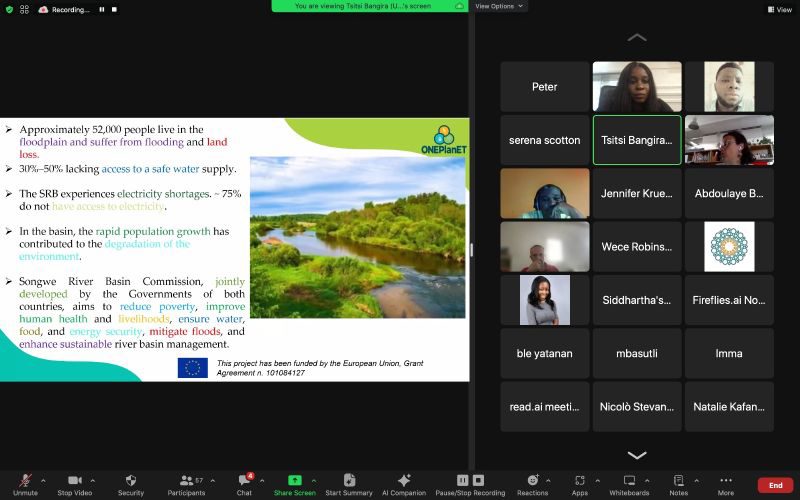This webinar titled “Innovative Approaches to sustainable Water-Energy-Food (WEF) Nexus management in Africa: Insights from ONEPlanET Case Study Areas”, presented findings from three representative case studies: the Songwe River Basin (Malawi/Tanzania), Inkomati-Usuthu (South Africa), and Bani River Basin (Mali). These case studies highlight diverse basin types, climate conditions, and socio-ecological systems, providing valuable insights into the complexities of WEF Nexus management. This diversity is crucial to the project’s co-creation process, making it essential to deeply understand local needs and challenges to develop user-centered educational materials and policy recommendations. This webinar focused on disseminating the findings and methodologies of the ONEPlanET project, enhancing the visibility and impact of sustainable water, energy, and food nexus management across diverse ecological systems in Africa.
Some of the highlights from the webinar discussions and presentations include;
- Introduction to the WEF Nexus ONEPlanET Approach: The webinar kicked off with an overview of the WEF Nexus ONEPlanET approach, explaining its essential principles for sustainable development. It also highlighted the interconnectedness of water, energy, and food systems and emphasized the importance of an inclusive and integrated approach to resource management within the ONEPlanET initiative.
- Case Study Insights and Implementation Challenges: Participants then explored findings from three pilot regions, revealing real-world applications of the WEF Nexus ONEPlanET approach. The session also addressed environmental, socio-economic, and institutional challenges faced in these regions, emphasizing the need for innovative, collaborative solutions to overcome barriers to sustainable resource management.
- Participatory Approaches for Stakeholder Engagement: Focusing on stakeholder engagement, this session showcased the participatory techniques and tools used in the project, underlining the value of collaborative consultation meetings. These approaches aim to foster inclusive dialogue and effective partnerships across sectors.
- Policy Development in the WEF Nexus: The discussion then shifted to policy creation and implementation, where successful interventions from the case studies were shared. This session provided interim recommendations for policymakers, stressing the importance of aligning policies with local needs to support the sustainable application of the WEF Nexus ONEPlanET framework.
- Future Outlook and Next Steps: Concluding the webinar, the final session looked toward the future of the ONEPlanET initiative, discussing plans for expansion, strategies for replicating successes, and avenues for further collaboration. The outlook emphasized the importance of continued efforts to foster sustainable resource management.

